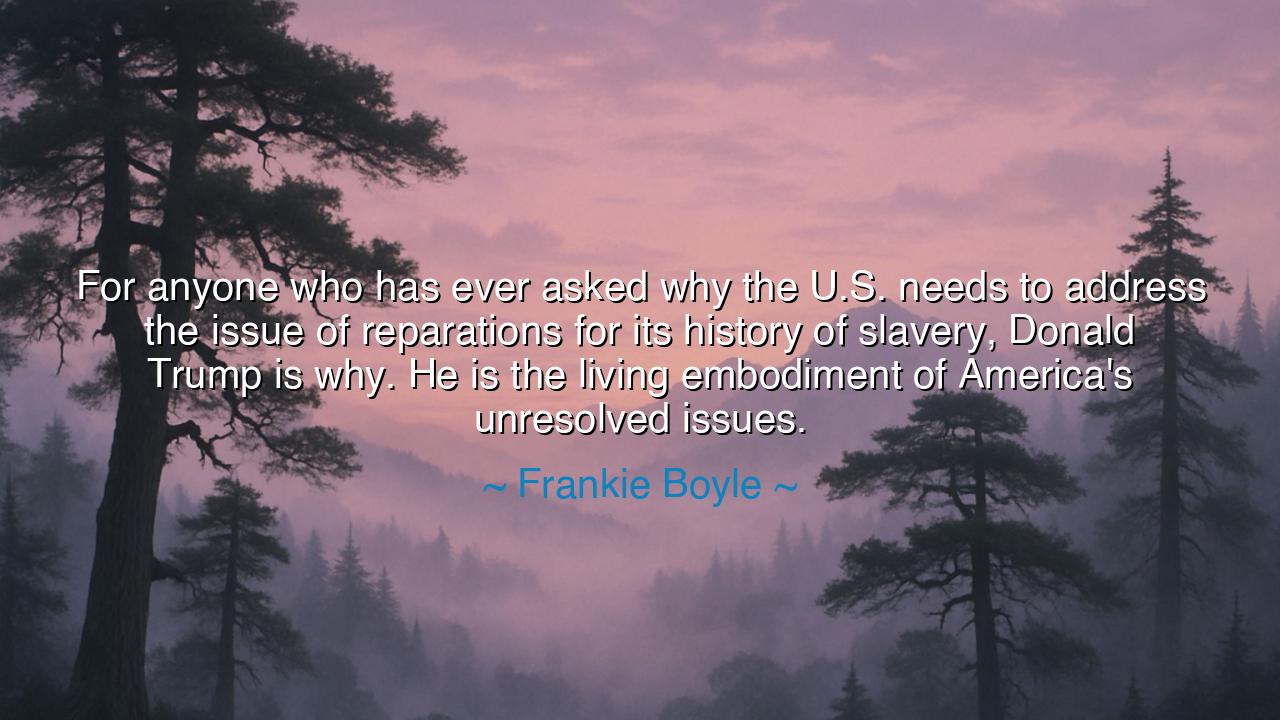
For anyone who has ever asked why the U.S. needs to address the
For anyone who has ever asked why the U.S. needs to address the issue of reparations for its history of slavery, Donald Trump is why. He is the living embodiment of America's unresolved issues.






“For anyone who has ever asked why the U.S. needs to address the issue of reparations for its history of slavery, Donald Trump is why. He is the living embodiment of America's unresolved issues.” – Frankie Boyle
In this searing reflection, Frankie Boyle, the Scottish satirist known for his sharp insight and unflinching truth, reveals more than a commentary on one man — he unveils a mirror held up to a nation’s soul. His words are not merely about politics, but about history, inheritance, and the unhealed wounds of a civilization. When Boyle calls Donald Trump the “living embodiment of America’s unresolved issues,” he speaks of the ancient truth that what is buried does not die. The ghosts of injustice — when left unacknowledged — rise again in the flesh of the present, demanding to be seen, to be answered.
The origin of this quote lies in the enduring conflict between the ideals of liberty that the United States proclaims and the legacy of slavery upon which much of its wealth was built. For centuries, the nation has spoken of freedom, yet denied it to millions. It declared equality, yet built systems that perpetuated inequality. Boyle’s observation suggests that Donald Trump is not an aberration, but a manifestation — the visible symptom of a deeper sickness. His rise to power, his rhetoric of division, and his appeal to grievance and supremacy all reflect the fractures that were never mended after slavery’s formal abolition. In this sense, Trump is not the disease itself, but the fever breaking out from a long-suppressed infection.
To say that he is “the living embodiment of America’s unresolved issues” is to recognize that history is not past. The sins of slavery, segregation, and racial oppression were never truly healed; they were only paved over by time and silence. Like cracks beneath a polished floor, they have widened with each generation, showing through in the struggles for civil rights, in the disparities of justice, wealth, and opportunity, and in the lingering fear and anger that shape the nation’s politics. Boyle’s words cry out that until these foundations are examined and repaired — until reparations are addressed, not only with money but with truth, education, and reconciliation — the nation will continue to recreate versions of its own trauma, dressing them in new forms, but never escaping them.
History provides many mirrors to this truth. Consider postwar Germany, a nation that faced its crimes not with denial, but with reckoning. Through reparations, education, and remembrance, it sought to ensure that the horrors of the Holocaust would never be forgotten or repeated. Contrast this with the United States, where slavery’s aftermath was followed not by healing, but by Jim Crow laws, lynching, and systemic exclusion. The failure to reckon with this legacy — to atone, to repair — left a moral void. Into such a void steps chaos, resentment, and demagoguery. In this way, Boyle’s observation becomes prophetic: without truth and justice, a society’s darkness will find new forms, new faces, new names.
It is not that one man alone bears this burden — rather, that the conditions which made his rise possible reveal what still festers beneath the surface. The anger, fear, and division that shaped his era are the same forces that once upheld slavery, segregation, and inequality. They are the echo of an old lie — the lie that some lives matter less than others. And just as an individual cannot heal while denying their wounds, so too can a nation find no peace while denying its sins. Boyle’s words demand that America look inward, not with guilt alone, but with responsibility — for only through acknowledgment comes transformation.
Yet within this dark truth lies also hope. For the recognition of sickness is the beginning of healing. To confront the truth of history is painful, but it is the only path to wholeness. If reparations — whether material, educational, or symbolic — are pursued not as punishment but as restoration, they can begin to close the wounds of centuries. To remember is not to live in the past; it is to redeem it, to break the cycle that allows pain to be reborn as politics, and injustice to masquerade as normalcy.
And so, the lesson stands clear: a nation cannot outrun its history. The past is not behind us — it is beneath us, shaping the ground we walk upon. Only when we dig deep into that soil, confront what lies buried, and plant the seeds of atonement can new life grow. Each generation must ask itself: what truths have we refused to face? What debts remain unpaid? What pain have we allowed to harden into habit? The wise will not avert their eyes, for they know that denial is the ancestor of decay, but truth — however bitter — is the beginning of renewal.
Let Boyle’s words, then, echo as both a warning and a call to action. To heal, we must look honestly at what we have been and what we still are. We must have the courage to make right what was wrong — to design a future where justice is not postponed, but lived. For until we do, the unresolved issues of the past will continue to take shape in the present, and the cycle of suffering will continue. But if we face them — if we choose truth over comfort — then from the ruins of denial, we may yet build a nation truly worthy of its promise.






AAdministratorAdministrator
Welcome, honored guests. Please leave a comment, we will respond soon